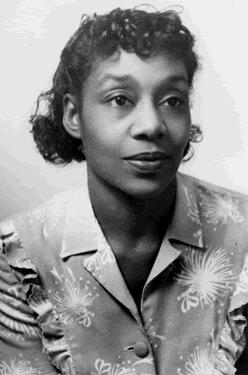BLACK SOCIAL HISTORY Dorothy West
Dorothy West (June 2, 1907 – August 16, 1998) was a novelist and short story writer during the time of the Harlem Renaissance. She is best known for her novel The Living Is Easy, as well as many other short stories and essays, about the life of an upper-class black family.
Early years
West was born in Boston on June 2, 1907, to Isaac Christopher West, who was formerly enslaved and later became a successful businessman, and Rachel Pegues Benson, one of 22 children. West reportedly wrote her first story at the age of 7. At age 14, she won several local writing competitions.
In 1926, West tied for second place in a writing contest sponsored by Opportunity, a journal published by the National Urban League, with her short story "The Typewriter". The person West tied with was future novelist Zora Neale Hurston.
Harlem Renaissance
Shortly before winning, Dorothy moved to Harlem with her cousin, the poet Helene Johnson. There Dorothy met other writers of the Harlem Renaissance, including Langston Hughes, Countee Cullen, and the novelist Wallace Thurman. Hughes gave Dorothy the nickname of "The Kid", by which she was known during her time in Harlem.
Before the Depression hit, Dorothy's principal contribution to the Harlem Renaissance was to publish the magazine Challenge, which she founded in 1934 with $40. In the decline of the Renaissance, it was symbol that she hadn't lost faith in herself, and that she would continue with her writing. She also published the magazine's successor, New Challenge. These magazines were among the first to publish literature featuring realistic portrayals of African Americans. Among the works published were Richard Wright's groundbreaking essay "Blueprint for Negro Writing," together with writings by Margaret Walker and Ralph Ellison.
In her later years Dorothy had become aware that, up until the Harlem Renaissance, it was almost impossible for a black female to sustain a career in writing. She was in fact one of the first female writers of color to have her works published. This later served as a permanent reminder that African American females weren't always recognized. West had explained in an interview that, due to the publishers' lack of interest, the audience never had a chance to be present. She also attributed her spark of inspiration, to her aunt's subscription to the NAACP's magazine Crisis.
Literary works
After both magazines folded because of insufficient financing, West worked for the Works Progress Administration's Federal Writers' Project until the mid-1940s. During this time she wrote a number of short stories for the New York Daily News. She then moved to Oak Bluffs on Martha's Vineyard, where she wrote her first novel, The Living Is Easy. Featuring an ironic sense of humor unique to West's style, the story chronicles the life of a young southern girl in pursuit of the upper class lifestyle. Published in 1948, the novel was well received critically but did not sell many copies.
In the subsequent four decades, West worked as a journalist, primarily writing for a small newspaper on Martha's Vineyard. In 1982 The Feminist Press brought The Living Is Easyback into print, giving new attention to West and her role in the Harlem Renaissance. As a result of this attention, at age 85 West finally finished a second novel, entitled The Wedding which portrayed the message that while race may be a false distinction, love knows no bounds. Published in 1995, the novel was a best-seller and resulted in the publication of a collection of West's short stories and reminiscences called The Richer, the Poorer. Oprah Winfrey turned the novel into a two-part television miniseries, The Wedding.
Death
West died on August 16, 1998, at the age of 91, at the New England Medical Center in Boston. Though her cause of death was never officially released, it is suspected that she died of natural causes. At her death, she was one of the last surviving members of the Harlem Renaissance. When asked what she wanted her legacy to be, she responded with "That I hung in there. That I didn't say I can't."
Literary works
- The Living Is Easy (1948; reissued 1982)
- The Wedding (1995)
- The Richer, The Poorer: Stories, Sketches, and Reminiscences (1995)
- The Dorothy West Martha's Vineyard: Stories, Essays and Reminiscences by Dorothy West Writing in the Vineyard Gazette eds. James Rober Saunders and Renae Nadine Shackelford. (2001)

































































































No comments:
Post a Comment